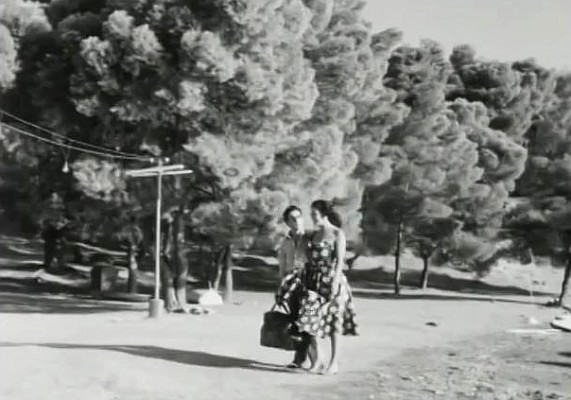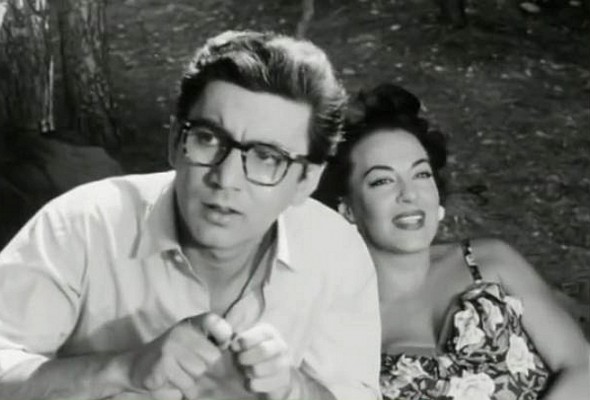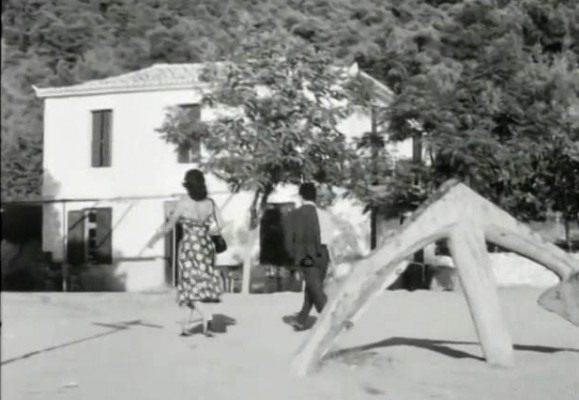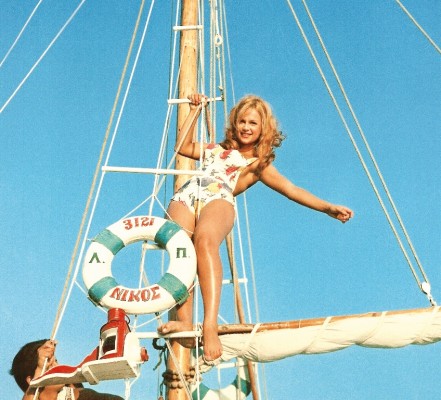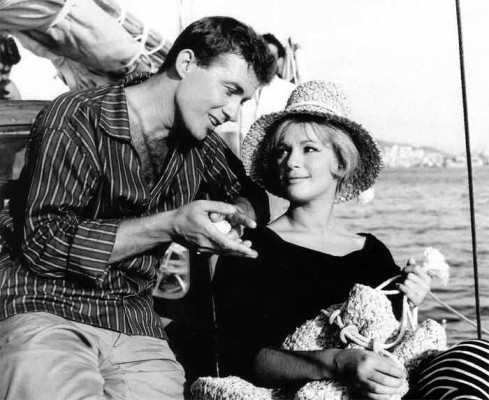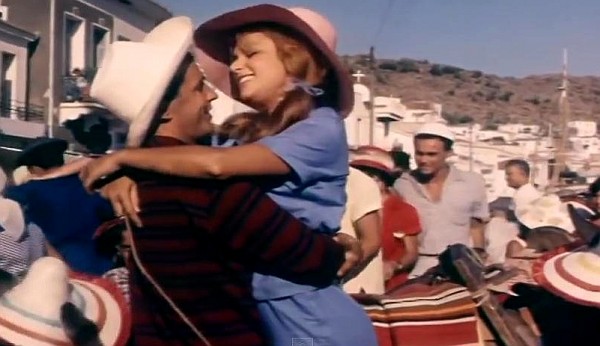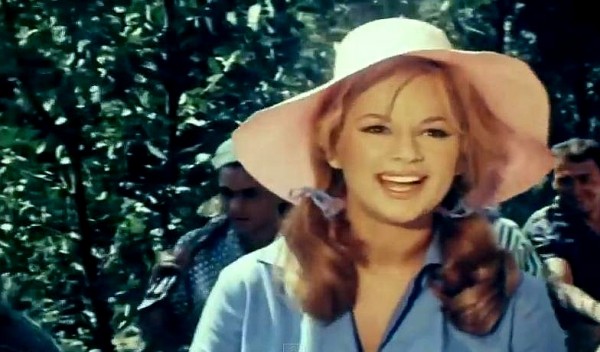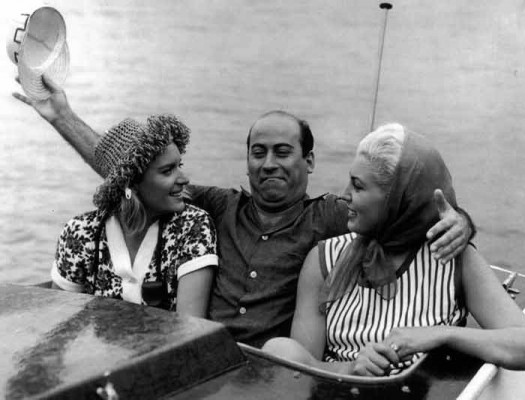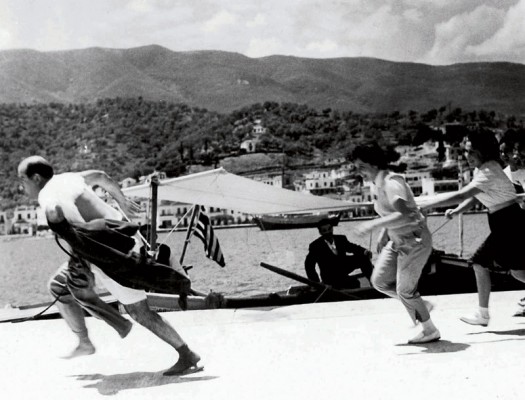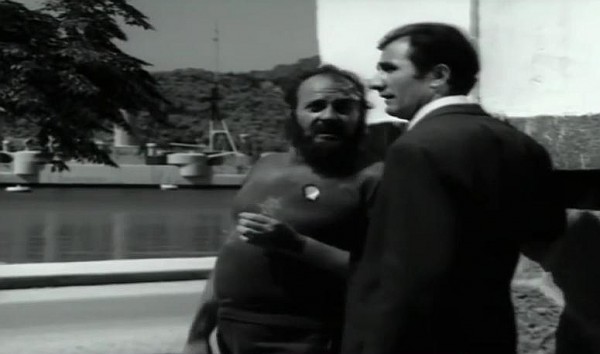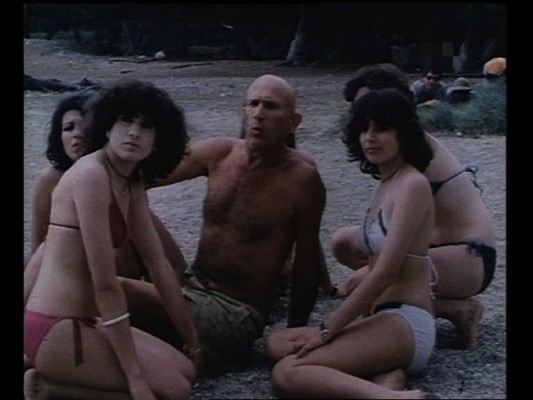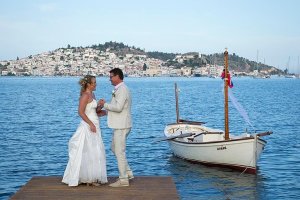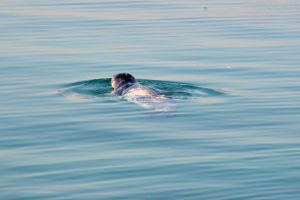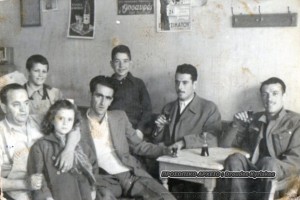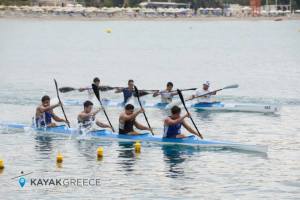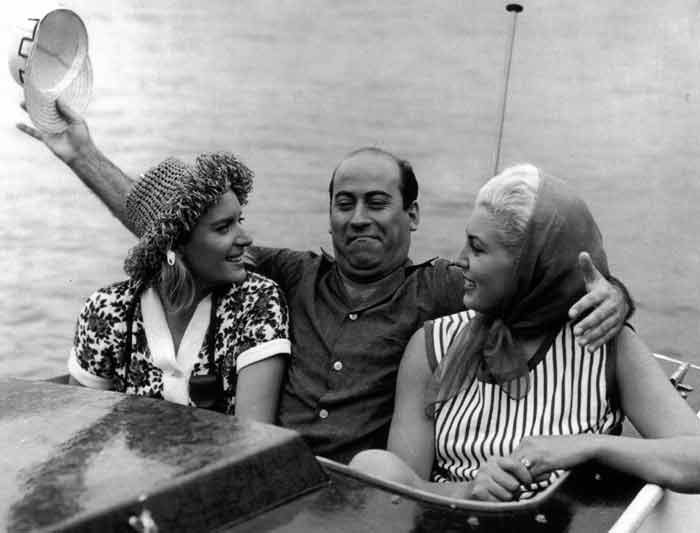
Poros has inspired writers, poets, painters, and, of course, filmmakers.
The island’s tourist development has been linked inextricably with its promotion through classic movies of the Greek cinema. From the late 1950s until today, Poros has been a popular destination for filmmakers, as it is picturesque, idyllic, lush, and easily accessible year-round.
1939: The first filming on Poros
The legendary Greek film producer Filopoimin Finos (Finos Films) directed the “Song of Separation” (To tragoudi tou horismou), starring the then-27-year old Greek comic actor Lambros Konstandaras. This movie was filmed only few months before the beginning of the second world war and was the first modern talkie whose entire processing in its entirety in Greek studios. This landmark film features the first footage of Poros. Nasos Argyropoulos, whose career includes over three decades as a producer-director for the Greek national broadcaster, describes some of the footage, including a ship’s passage through the strait en route to Hydra.
“Looking at those shots, I was struck by the fact there were several yachts anchored in the port of Poros,” says Mr. Argyropoulos. “Given the fact that the country was heading into a war, the only thing I can guess is that those yachts hosted British agents. ”
The Fifties: Romancing the island
In the early 1950s, Poros had a “cameo” in the director Mihalis Cacoyannis’s 1955 masterpiece “The Girl in Black” (To koritsi me ta mavra), starring Ellie Lambeti and Dimitris Horn. The film was set on Hydra, but Poros featured in the opening titles. “The film begins with the departure of the boat Pindos from the port of Piraeus,” says Mr Argyropoulos. “Captain Yannis Trypos from Poros can be seen in this footage. However, although the Pindos sails from Piraeus, it is the Neraida shown arriving at Poros. This was apparently because the film crew traveled with Pindos and the director, Cacoyannis, wanted to film an arrival at Poros. This was the arrival of the Neraida.”
In 1957, Poros features once again in the opening sequence of a film set on Hydra: Jean Negulesco’s “Boy on a Dolphin”, with the stunning Sophia Loren. The film—which also features the islands of Rhodes, Delos, and Mykonos—was a huge commercial success. Loren also visited Poros for a few days of vacation, giving rise to a local urban legend after a boatman, Luke Klirodotakos, named his boat Sophia Loren.
In 1958, Poros moved from the credits to center stage with three films shot on the island. Orestes Laskos chose Poros as the setting for “Away From the World” (Makria apo ton kosmo), an adaptation of Kiki Dekoulakou’s novel The Monastery starring Andreas Barkoulis, Christina Sylva, Beata Asimakopoulou, and Christoforos Nezer. That same year, the island was also the setting for a second film: Italian director Umberto Lenzi’s “An Italian in Greece” (Mia Italida stin Ellada), featuring Wandisa Guida, George Velentza, Mimis Fotopoulos, Dionysis Papayannopoulos, Barkoulis, and Stavros Xenides.
But the best-known film shot on Poros that year was Yorgos Tzavellas’s bittersweet comedy “You Only Live Once” (Mia zoi tin ehoume). The classic black-and-white film captured filmgoers’ imaginations with the sizzling on-screen romance between leads Dimitris Horn and the exuberant Yvonne Sanson. “Horn and Sanson did not have the best relationship behind the cameras,” Mr Argyropoulos reveals. “Horn was a bon viveur and Sanson bored him to death. Sanson’s insecurity is apparent by her excessive makeup “.
Despite the off-screen tension, the cinematic chemistry of these two actors has been recorded in the history of Greek cinema, with romantic scenes were filmed at Love Bay and along the Neorio seafront against the backdrop of the anchor half-buried outside the Tourlakakis Hotel . The film was edited by the “master” Dinos Katsouridis. Returning to Poros four decades later, Katsouridis visited the sites captured and enhanced by his lens. “Oh Nasos! Where have you brought me?” he exclaimed to his host, Nasos Argyropoulos.
In 1959, filmgoers got yet another glimpse of Poros in Andreas Labrinos’s “The Trip of Love” (To taxidi tou erota), which was filmed on all four Saronic islands—Aegina, Poros, Hydra, and Spetses. The film starred Jenny Karezi, Dimitris Murat, Konstandaras, Aleka Katseli, Rita Mousouri, and Costas Kakkavas.
The Sixties: Vengos’s charm and Aliki joins the Navy
Greek cinema’s golden decade began with Robertos Manthoulis’s 1960 “The Lady Mayor” (I kyria dimarhos), which included footage of Daskaleio.
In 1961, Poros found fame as the setting of Alekos Sakellarios’s “Alice in the Navy” (I Aliki sto Naftiko), starring one of Greek cinema’s most popular couples, Aliki Vouyiouklaki and Dimitris Papamihail. This tender comedy was a huge hit, with ticket sales of 213,409 that year alone. The first color film by the Finos Film Studio, it remains popular today and ranks 58th on all-time Greek films, with frequent screenings on commercial television. “Alice in the Navy” also advertised Poros abroad as it was informally shown at the Cannes Film Festival.
Several scenes were set in the Villa Diamantopoulou, but a scene special for many locals is one in which Vouyiouklaki rides a donkey through the town, from the “arch” to Koryzis square. The reason: all the extras are locals and Poriotes love pointing out themselves, friends, or relatives, as children.
An acclaimed screenwriter and poet as well as director, Laskos fell under Poros’s spell and in the three years following release of “Alice in the Navy”, he made three more films on the island.
In 1963, on September 16 to be precise, one of the funniest films in the history of Greek cinema hit theaters: Laskos’s “Marlon Brando, Who?” (Tyfla na’hei o Marlon Brando) starring Thanassis Vengos, probably the best comedic actor in the history of Greek cinema.
Filming took place around the island—from the harbor to Villa Galini—but most of the scenes were set at the Golden Dawn Hotel (or Golden View, as it’s known today) in Askeli. Locals appeared as extras in numerous scenes. In one of the most hilarious, a group of women rush towards Vengos, causing him to panic and shout: “Help me, Christians! Calm down, you crazy girls. Stand back or I will get a stone. Back off, you crazy women!” He then dives into the sea off the waterfront at Karamanou square by city hall. The film sold 230,117 tickets.
That same year, Laskos also shot the comedy “Young and Old in Action” (Mikri, megali en drassi) starring Konstandaras and Mary Aroni. The film was an adaptation of the theatrical comedy “Our Children, These Watchdogs” by Asimakis Gialamas and Costas Pretenteris and cut 327, 419 tickets. He shot his fourth film on Poros in 1964—“People and Poor People” (Kosmos kai kosmakis)—on a screenplay by Polyvios Vassiliadis and Nikos Tsiforos.
In 1965, Costas Strantzalis filmed his drama “Why Was I Born Poor” on Poros, followed two years later by Vangelos Selinos’s “My Son-in-Law the Gold-Digger” (O gambros mou o prikothiras) starring Yorgos Pantzas, Yannis Gionakis, and Papayannopoulos. The Sixties’ golden era culminated with Alekos Sakellarios’s acclaimed comedy “Captain Jack of Spades” (Kapetan fantis bastounis), a realistic look at rural life set against the Poros landscape.
The 1970s & 1980s: Adult films movies and cult comedies
Greek film productions of the Seventies did not resemble those of previous decades. By the mid-1980s, Poros had become the setting for several soft core such as the 1971 “Sinful Minors” (Anilikes amartoles) directed by Omiros Efstratiadis and even some hard core adult films.
With the surge in the image of the Greek as a great lover and accomplished pick-up artist or kamaki in the late 1970s and early 1980s, Efstratiadis returned to Poros in 1982 to film “He Was Worthy” (Itan axios), a comedy that has become a cult classic of the adult genre. The film starred Kostas Gousgounis, a legend of the genre. Poros also features in Yannis Dalianidis’s more mainstream comedy “Come Get Naked, Darling” (Ela na gymnothoume darling).
Diane Shugart



